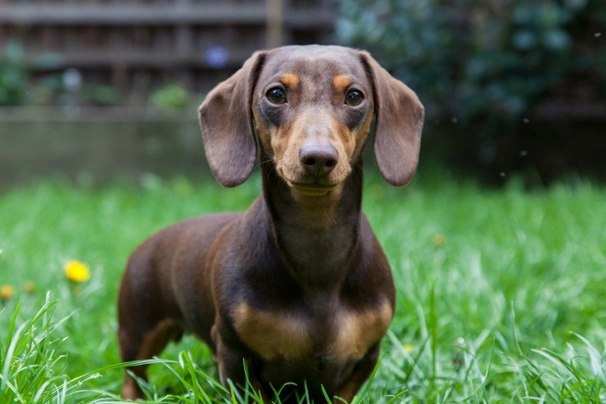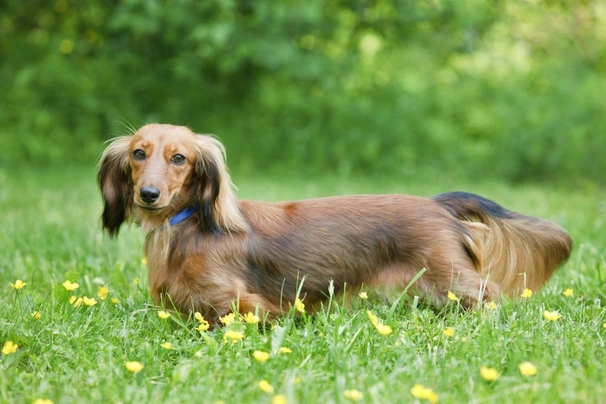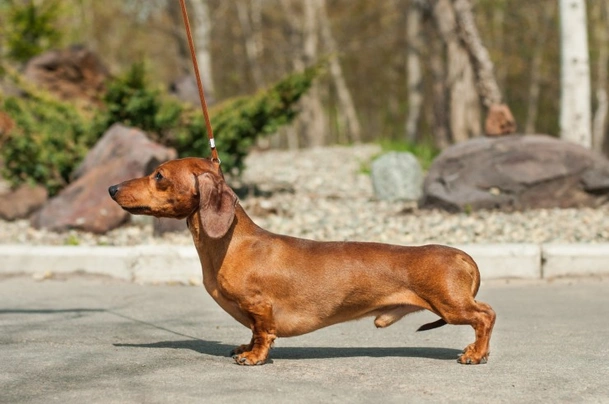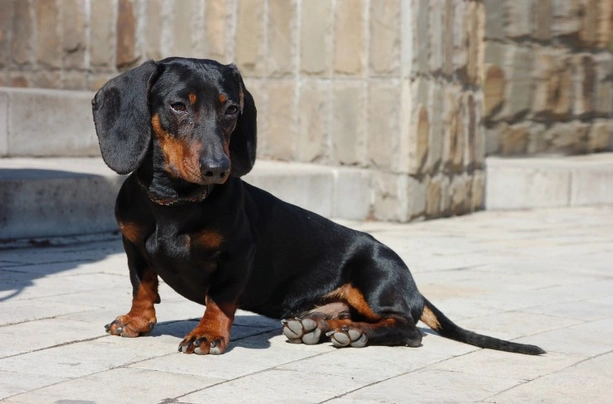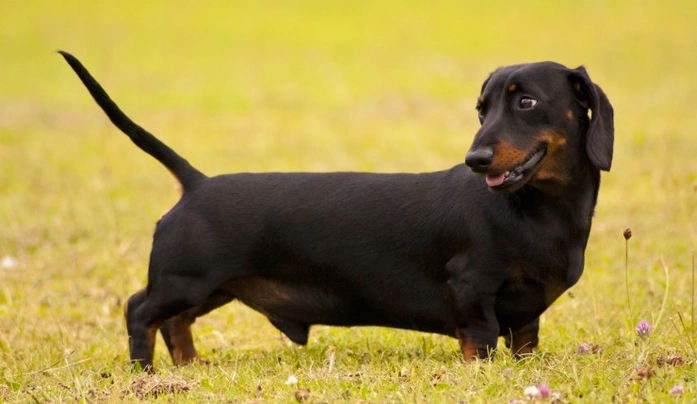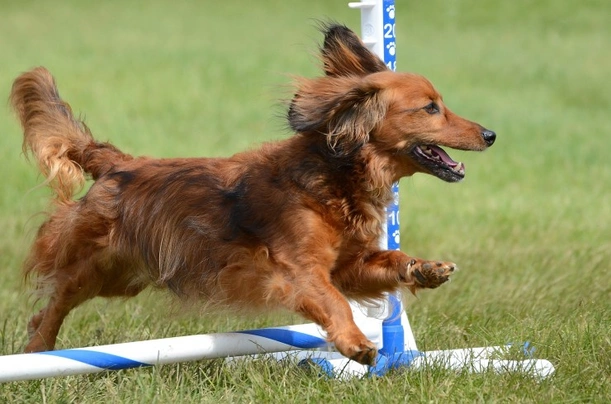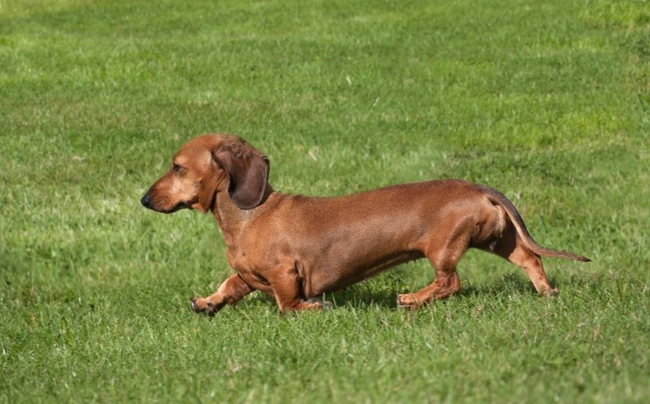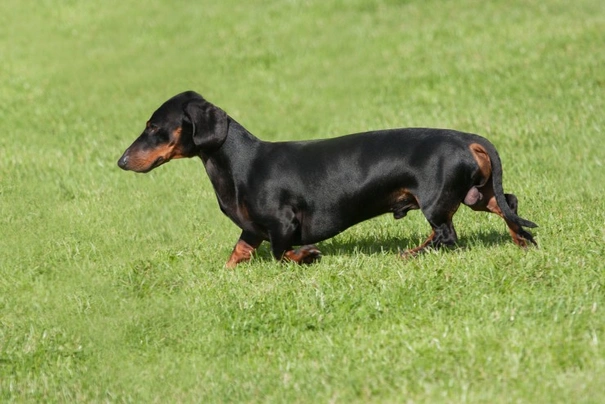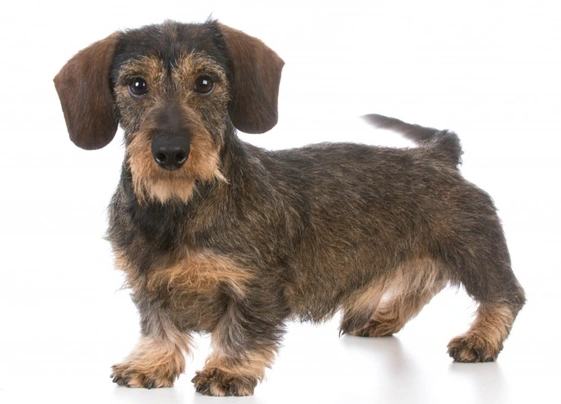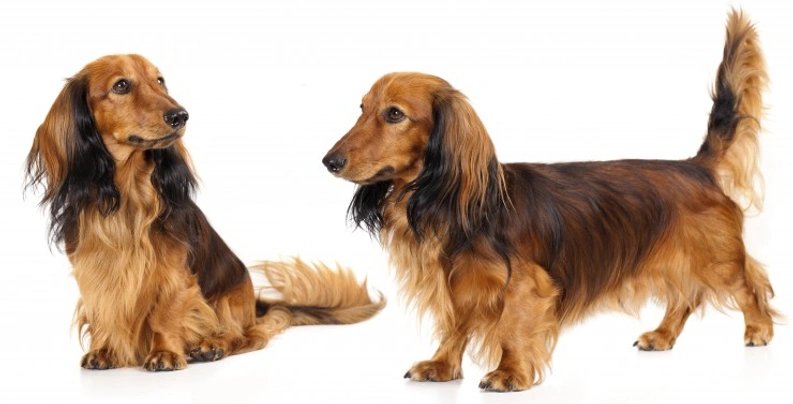Miniature Dachshund
Pros
Cons
Introduction of the Miniature Dachshund
Dachshunds are originally from Germany and have a long and interesting lineage. They were originally bred to hunt badgers and rabbits and to track injured deer. The Miniature Dachshund is the smallest of the two types, with the Standard Dachshund being the larger dog. Today, these charming short-legged dogs are among the most popular companion dogs and pets both here in the UK and elsewhere in the world. Miniature Dachshunds are always a big hit at dog shows thanks to their charming appearance and gentle, affectionate nature.
Miniature Dachshunds, like their larger cousins, love to stay busy, and once they reach maturity, they enjoy being outdoors, which usually makes an owner tire much more quickly of their little canine companions. They are highly adaptable, although they are not the most disciplined when it comes to obedience, especially if the "hunter" in them takes over and they decide to explore an interesting scent. That said, Miniature Dachshunds are the perfect choice for people who lead a less active life and would like to share their time with a small, loyal, affectionate, and devoted canine companion by their side.
History of the Miniature Dachshund
Dachshunds originate from Germany and have an ancient and interesting genealogy. They were originally bred to hunt badgers and rabbits and to track wounded deer. The Miniature Dachshund is the smaller of the two types, while the Standard Dachshund is the larger of the two. Today, these charming short-legged dogs are among the most popular companion dogs and pets both here in the UK and around the world. Miniature Dachshunds are always a great success at dog shows due to their charming appearances and their gentle, affectionate natures.
Miniature Dachshunds, like their larger cousins, love to stay busy and once matured, enjoy being outdoors, which usually tires an owner much more quickly than their smaller canine companions. They are highly adaptable, although they are not the most obedient, especially if the "hunting dog" in them takes over and they decide to explore an interesting scent. That said, Miniature Dachshunds are the perfect choice for people who lead a less active lifestyle and wish to share their time with a small, loyal, affectionate, and devoted canine companion by their side.
Appearance of the Miniature Dachshund
Dachshunds originate from Germany and boast an ancient and interesting genealogy. They were originally bred to hunt badgers and rabbits and to track wounded deer. The Miniature Dachshund is the smaller of the two types, while the Standard Dachshund is the larger dog. Today, these charming short-legged dogs are among the most popular companion dogs and pets both here in the UK and around the world. The Miniature Dachshunds are always a big hit at dog shows too, thanks to their charming appearances and their gentle, affectionate natures.
Miniature Dachshunds, like their larger cousins, love to stay busy, and once mature, they enjoy being outdoors, which usually tires an owner out much faster than their small canine companions. They are highly adaptable, though they are not the most obedient, especially if the "hunting dog" in them takes over and they decide to explore an interesting scent. That said, Miniature Dachshunds are the perfect choice for people leading a less active life who want to share their time with a small, loyal, affectionate, and devoted canine companion by their side.
Temperament of the Miniature Dachshund
The Miniature Dachshund is a very intelligent dog and possesses a remarkable amount of courage, which can sometimes prove to be its weakness. They are extremely loyal and form strong bonds with their owners and families. They may be small in stature, but the Miniature Dachshund is an energetic dog and, as such, desires nothing more than to be outside and engaged in some activity. They have great stamina, which means they are quite happy to get as much exercise as possible once fully grown.
Being so intelligent, they also need a lot of mental stimulation every day to be truly happy and well-balanced. That said, a Miniature Dachshund is quite happy to relax and unwind when they are tired. The old adage "a tired dog is a good dog" has never been truer when describing a Miniature Dachshund.
They can be quite stubborn, which means they can be a bit disobedient when they want to, which is why their training should start as early as possible, paying special attention to the "recall" command. It is also important that puppies are well-socialized from a young age, which should include introduction to as many new situations, sounds, people, other animals, and dogs as possible once they are fully vaccinated, so that they mature into well-balanced adult dogs.
They can be quite vocal, especially when there are strangers around or when they dislike something happening in their environment. They have a fairly loud bark considering their small size and will be quick to alert their owners if something is wrong. Although friendly by nature, they tend to be aloof and wary of strangers, although a Miniature Dachshund would rarely show any form of aggression towards an unfamiliar person, preferring to keep its distance and bark until it gets to know someone.
Because they form such strong bonds with their owners and, more specifically, with the person who usually takes care of them, these small dogs do not like being left alone for long periods of time at all. If they are, it is very likely they will suffer from significant separation anxiety, which can lead dogs to develop unwanted and rather destructive behavioral problems at home. This includes chewing on furniture and anything else they find, as dogs relieve stress this way. They can be quite difficult to house train, but with a lot of patience and understanding, a Miniature Dachshund can be taught to keep the house clean and go outside for its needs.
Although they are great companions, the Miniature Dachshund is not the best choice for first-time owners because they can be quite challenging to train, all due to their strong stubborn streak. They are better suited to people who are familiar with the breed or who have previously owned a similar dog and in families where someone usually stays home when everyone else is out.
Are they a good choice for first-time owners?
Miniature Dachshunds are not the best choice for first-time dog owners because they can be more difficult to train, and if allowed, these small dogs can quickly become stubborn and therefore more challenging to live with and manage.
What about their prey drive?
Miniature Dachshunds have a strong prey drive, which is a trait deeply ingrained in the dog's psyche, and it is important to let them run off-leash only in safe and secure areas. It is also useful to note that Miniature Dachshunds are "tracking dogs" and therefore have an incredible sense of smell, so if they catch an interesting scent, they are likely to immediately investigate what is on the other side, ignoring the "recall" command.
What about playing?
Miniature Dachshunds are playful by nature and have very comical personalities. They love interactive games, but it is always necessary to be cautious when playing with them as puppies, in case the dog injures its spine by slipping.
What about adaptability?
Miniature Dachshunds are highly adaptable, being happy to live both in an apartment in the city or a house in the countryside, but it is important that they receive enough daily exercise when they are big enough to avoid becoming obese, which can seriously affect the dog's health and overall well-being.
What about separation anxiety?
Miniature Dachshunds form extremely strong bonds with their owners and, as such, hate being left alone for long periods of time, which is why, as mentioned, they are better suited to families where someone stays home when everyone else is out.
What about excessive barking?
Miniature Dachshunds love the sound of their own voice, with some lines more prone to excessive barking than others. The good news is that they are very intelligent and can be taught that persistent barking is not acceptable and exceeds a limit, but this needs to be done gently when the Miniature Dachshund is still young, being careful not to be too harsh, as it could have a negative rather than positive effect.
Do Miniature Dachshunds like water?
Miniature Dachshunds, with their long bodies and short legs, are not natural swimmers, so it is always necessary to be cautious when a dog is near water, in case it falls in.
Are Miniature Dachshunds good guard dogs?
Miniature Dachshunds may be small, but they are extremely good guard dogs and will quickly alert the owner when there are strangers around or if something happens that they do not like in their environment.
Intelligence / Trainability of the Miniature Dachshund
The Miniature Dachshund is a very intelligent dog and possesses immense courage, which can sometimes be a weakness. They are extremely loyal and form strong bonds with their owners and families. They may be small in stature, but the Miniature Dachshund is an energetic dog and, as such, loves to be active and engaged. They have enormous stamina, which means they are quite happy to get as much exercise as possible once they are fully grown.
Being so intelligent, they also need a lot of mental stimulation every day to be truly happy and well-balanced. That said, a Miniature Dachshund is quite happy to relax and rest when they are tired. The old adage "a tired dog is a good dog" has never been truer when describing a Miniature Dachshund.
They can be quite willful, which means they can be a bit disobedient when they want to, which is why their training needs to start as early as possible, with particular attention to the "recall" command. It is also important that puppies are well-socialized from a young age, and this should include exposure to as many new situations, noises, people, other animals, and dogs as possible once they have been fully vaccinated, so they grow into well-balanced adult dogs.
They can be quite vocal, especially when there are strangers around or when they dislike something happening in their environment. They have fairly loud barks considering their small size and will quickly alert their owners if there is something suspicious. Although friendly by nature, they tend to be aloof and wary of strangers, although rarely does a Miniature Dachshund show any form of aggression towards an unfamiliar person, preferring to keep its distance and bark until it gets to know someone.
Because they form such strong bonds with their owners and especially with the person who usually takes the most care of them, these small dogs do not like being left alone for long periods. If this happens, it is very likely they will suffer from significant separation anxiety, which can lead to unwanted and destructive behaviors at home. This includes chewing on furniture and anything else they find, which is a way to relieve stress. They can be quite difficult to house train, but with a lot of patience and understanding, a Miniature Dachshund can be taught to be house-trained and to do its business outside.
While they are great companions, the Miniature Dachshund is not the best choice for first-time owners because they can be quite challenging to train due to their strong-willed nature. They are better suited to people who know the breed or have previously owned a similar type of dog and in families where someone is usually at home when others are away.
Are they a good choice for first-time owners?
Miniature Dachshunds are not the best choice for first-time dog owners because they can be more difficult to train and, if not controlled, these small dogs can quickly become willful and thus harder to manage and live with.
And what about their prey drive?
Miniature Dachshunds have a high prey drive, which is a deeply ingrained trait in the dog's psyche, so it is important to let a dog off-leash only in secure and protected areas. It is also important to note that Miniature Dachshunds are "tracking dogs" and therefore have an incredible sense of smell, so if they catch an interesting scent, they are likely to immediately venture off to investigate what’s at the other end, ignoring a "recall" command.
And what about play?
Miniature Dachshunds are playful by nature and have very comical personalities. They love interactive games, but it is always important to be cautious when playing with them as puppies, in case the dog injures its back by slipping.
And what about adaptability?
Miniature Dachshunds are highly adaptable, being equally happy living in a city apartment as in a country house, but it is important that they receive enough daily exercise when they are big enough to prevent them from becoming obese, which can seriously affect the dog’s health and overall well-being.
And what about separation anxiety?
Miniature Dachshunds form extremely strong bonds with their owners and, as such, hate being left alone for long periods, which is why, as mentioned earlier, they are better suited to families where someone stays at home when others are out.
And what about excessive barking?
Miniature Dachshunds love the sound of their own voice, with some lines more prone to excessive barking than others. The good news is that they are very intelligent and can be taught that persistent barking is unacceptable and exceeds a limit, but this needs to be done gently when a Miniature Dachshund is still young, being careful not to be too harsh as it may have a rather negative rather than positive effect.
Do Miniature Dachshunds like water?
Miniature Dachshunds, with their long bodies and short legs, are not natural swimmers, so it is always important to be cautious when a dog is near water, in case it falls in.
Are Miniature Dachshunds good watchdogs?
Miniature Dachshunds may be small, but they are extremely good watchdogs and would quickly alert an owner if there are strangers around or if there is something they dislike in their environment.
Children and other
Miniature Dachshunds thrive in a family environment where the children are slightly older and who therefore know how to behave around such a small dog. They are not the best choice for families where the children are younger because they prefer living in a quieter environment. As such any interaction between toddlers or younger children and a dog should always be supervised by an adult to make sure things don't get too noisy or boisterous which could end up with a dog getting a bit snappy.
If a Miniature Dachshund has been well socialised from a young enough age they generally get on with other dogs although if they feel threatened in any way they will stand their ground even when faced with a much larger dog. As such care should be taken when out in places where other dogs are often taken by their owners. Care also should be taken when a Miniature Dachshund is around cats or other small animals and pets because their high prey drive might just get the better of them with disastrous results. In short any contact should be avoided.
Health of the Miniature Dachshund
The average lifespan of a Miniature Dachshund is between 14 and 17 years if properly cared for and fed a high-quality diet suitable for their age.
Dachshunds enjoy a long lifespan when well cared for and fed a nutritious, high-quality diet while receiving the right amount of daily exercise. However, as a "dwarf breed," they are prone to suffering and developing back problems, including a disorder known as IVDD. There are health issues considered as "health priorities" by the breed council, which are as follows:
- Lafora Disease - a type of epilepsy seen in Miniature Dachshunds with Wire Hair (MWHD) - Genetic test available
- Intervertebral Disc Disease (IVDD) - a back problem observed in all 6 types of Dachshunds
- Progressive Retinal Atrophy cord1 - a degenerative condition affecting all Miniature Dachshunds - Genetic test available at the Animal Health Trust
Other conditions reported in the breed include:
- Idiopathic Epilepsy - a condition affecting Miniature Dachshunds with Long Hair (MLHD)
- Distichiasis - a condition affecting Miniature Dachshunds with Long Hair
- Acanthosis Nigricans (Dark Spots on the Skin)
- Pattern Baldness
- Vitiligo
- Thyroid Problems
- Allergies
- Patellar Luxation
- Obesity
Greater Attention to Conformation
The conformation of a Dachshund is crucial, and any type of exaggeration can seriously and negatively affect the overall health and well-being of a Mini. Minis have a gene responsible for their short legs, which is a natural development that occurred thousands of years ago, and the Dachshund is one of the breeds that evolved from dogs that were present so long ago.
Even with short legs and a particular conformation, Miniature Dachshunds, like their larger cousins, are more than capable of getting all the exercise an owner can provide. However, it is crucial that Minis are bred responsibly so the breed continues to enjoy good health. Therefore, any exaggeration and deviation from the Kennel Club breed standards are frowned upon, and any breeder who attempts to exaggerate the physical characteristics of a Miniature Dachshund should be avoided at all costs.
What About Vaccinations?
Miniature Dachshunds would have been vaccinated before being sold, but it is up to the new owners to ensure their pets receive the follow-up vaccinations, and the schedule is as follows:
- 10-12 weeks of age, noting that a puppy will not have full protection immediately but will be fully protected 2 weeks after receiving the second vaccination
There has been much discussion about the need for boosters. Therefore, it is best to consult with a veterinarian before making a final decision on whether a dog should continue to receive annual vaccinations, known as boosters.
What About Spaying and Neutering?
A study conducted several years ago found that neutering male Dachshunds exposes them to a higher risk of developing IVDD, with dogs undergoing the procedure under 1 year of age being at greater risk. Therefore, the risks should be weighed against the benefits before deciding whether to neuter a male Dachshund and when to perform the procedure.
When it comes to female Miniature Dachshunds, the situation is more complex as health benefits often outweigh the risk of developing health problems. That said, research has concluded that it depends on the age at which the procedure is performed on a Miniature Dachshund and the risk of developing health issues; therefore, regarding spaying and neutering, it is best to wait until a Miniature Dachshund is fully mature, although veterinarians often advise avoiding neutering the dog altogether in males.
What About Obesity Issues?
Miniature Dachshunds are prone to gaining excess weight, with obesity being a real problem in the breed. It is essential that owners keep an eye on the dog's weight and adjust caloric intake and daily exercise if a dog starts to gain weight. Carrying excess pounds can seriously and negatively affect a dog's overall health and well-being. It might even shorten their lifespan by several years.
What About Allergies?
Miniature Dachshunds are prone to developing allergies, which include problems affecting their skin. Many things can trigger an allergic reaction, and finding them can often be extremely difficult. The most common triggers include:
- Environment
- A reaction to certain chemicals commonly found in household cleaning products
- Seasonal allergies including pollen and grasses
- Food including certain types of meat and grains often used as ingredients in commercially produced dog foods
- Ticks and flea bites
- Dust mites
- Mold
Participation in Health Issues
Miniature Dachshunds, whether smooth-haired, long-haired, or wire-haired, should be tested for PRA-cord1, a hereditary degenerative disorder affecting the dog's retina. The test is available at the Animal Health Trust.
Miniature Wire-Haired Dachshunds should be tested for Lafora Disease, which is a type of epilepsy affecting the wire-haired variety of the breed. The test is available at the Wire-Haired Dachshund Club.
It is worth noting that much research is ongoing on Back Disease seen in the breed, but currently, there is no test available in the UK.
What About Breed-Specific Restrictions?
Since January 1, 2010, the Kennel Club has stated that puppies produced where both Dachshund parents are dapple can no longer be registered with the club due to health issues associated with the dapple gene, i.e., compromised hearing and vision.
It is also worth noting that Dachshund parent dogs of the same type can also produce puppies with different coat types, which can be registered with the Kennel Club as belonging to the type that most resembles their coats. However, the provision does not include swapping Dachshunds of two different sizes, and all registrations must be completed in writing by mail.
What About Certified Breeder Requirements?
It is mandatory for all Kennel Club certified breeders to use the following:
Caring for the Miniature Dachshund
As with any other breed, Miniature Dachshunds need regular grooming to ensure their coat and skin are kept in excellent condition. They also need daily exercise to ensure they stay fit and healthy. Additionally, dogs should be fed high-quality food that meets all their nutritional needs throughout their lives.
Care for a Dachshund Puppy
The moment a Miniature Dachshund puppy is introduced to its new home is crucial because, in the first few days and nights, everything will seem very strange to such a young dog. In short, it's best to arrange their arrival when there will be people around for the first week so that a puppy is never alone. Miniature Dachshund puppies are adorably cute, but it's important to treat them with respect and care, especially since a puppy will likely want to sleep for longer periods.
Another thing to keep in mind is that there will inevitably be some "accidents" when a puppy arrives home, and they should not be scolded but rather encouraged to do their "business" outside or on a puppy pad. It's essential to prepare the house and garden for puppies well in advance to keep the new arrival safe, and it's important to set up a quiet area for a puppy, making sure it's not too out of the way because they need to know they are not alone and that someone is around. The area should simply be away from too much activity that could prevent a puppy from taking a nap when desired.
Some people prefer to keep the puppy safe by placing it in well-made dog crates with ample bedding, while others set up a puppy pen with a comfortable dog bed where the puppy can snuggle when it wants to sleep between lively playtimes. If there are children around, it's important to teach them not to disturb a puppy when it is sleeping and to leave it alone even when it is eating.
Miniature Dachshunds can be a bit more difficult to house train, but with patience, understanding, and perseverance, these little dogs can be taught to go to the bathroom outside. It may simply take a bit more time compared to other breeds. When a puppy does the right thing, it's essential to reward them with plenty of praise without being too loud about it. Puppies need to go to the bathroom more frequently than larger dogs, so it's important to note when they need to go and ensure that someone is around to take them outside to the garden or for a short walk to relieve themselves.
The documentation provided by a breeder for a puppy should include all details about the date of worming treatment and the product used, along with information related to their microchip. It is essential for puppies to be rewormed according to the following schedule:
- Puppies should be wormed at 6 months of age
- They should be treated again when they are 8 months old
- Puppies should be wormed when they are 10 months old
- They should be treated when they are 12 months old
Things You Will Need for Your Puppy
There are a few items that need to be purchased well in advance of the puppy's arrival, including:
- Food and water bowls, ensuring they are not too deep and ideally should be ceramic rather than plastic or metal
- A collar, a harness, and a high-quality leash
- A dog crate that is neither too small nor too large, where a puppy could get lost
- A well-made dog bed, keeping in mind that a puppy might chew on it
- Baby and/or dog blankets to use in the puppy’s crate and dog bed
- Dog-specific toothpaste and toothbrush
- A selection of high-quality toys and chewables for a puppy to gnaw on
- Shampoo and conditioner specifically formulated for use on dogs
- Grooming equipment
Reducing Noise
All puppies are very sensitive to loud noises, so it's important to keep the television volume low and not play music too loudly, as it might scare a Miniature Dachshund puppy and prevent it from taking naps during the day.
Keeping Up with Vet Appointments
Reliable breeders always ensure their puppies are vaccinated before being sold, but as mentioned, it's up to the new owners to ensure they receive booster vaccinations at the appropriate times, which should be as follows:
- 10-12 weeks of age, keeping in mind that a puppy will not have full protection immediately but will be fully protected 2 weeks after receiving the second vaccination
Regarding boosters, it's best to discuss them with a vet since there is much debate about whether a dog really needs them after a certain time. However, if a dog ever goes into boarding, its vaccinations should be
What Happens to Miniature Dachshunds When They Reach Their Golden Years?
When Miniature Dachshunds reach their golden years, they slow down in many ways and may start to show their age with more gray hairs on their face, especially around the muzzle. In addition to a change in their appearance, a Miniature Dachshund's personality might also change in how they respond to commands or when called by name. The reason for this is that many older dogs have hearing that is not as sharp as it once was. Other changes to watch for in a Miniature Dachshund as it reaches its advanced age include:
- Their vision may be compromised, and their eyes may appear cloudy
- Their teeth may no longer be in good condition, meaning they might need dental work
- Older dogs tend to sleep more during the day and wake up more frequently during the night, often because their cognitive function is not as sharp as when they were younger, meaning older dogs are more easily confused
- They tend to be less tolerant of noise and loud sounds
- Older dogs may be a bit more finicky about food, so it’s important to reconsider their diet and ensure they are getting all the nutrients they need to stay healthy
- An older dog’s immune system often does not provide the same protection against diseases and infections, which makes them more susceptible to illness and thus they should see the vet more regularly
- An older Miniature Dachshund may not be as enthusiastic about going for walks, especially longer walks
- Muscle tone and body condition are not as good as when they were young
- Older dogs often suffer from joint problems that can lead to arthritis, so it’s worth investing in a comfortable dog bed and ideally one that a Miniature Dachshund finds easier to get out of
Grooming of the Miniature Dachshund
Miniature Dachshunds with smooth coats have dense, short fur and, as a result, require minimal grooming maintenance. A weekly brushing is all that is needed to keep their fur in good condition and remove dead hair. A quick wipe with a chamois cloth will also help maintain a nice shine on their coat. Dogs with long fur require slightly more maintenance and need more brushing to prevent mats or tangles, paying particular attention to the hair around the ears, legs, and abdomen, which are finer and therefore more prone to tangling and matting.
They shed year-round, but more abundantly in the spring and then again in the fall, when more frequent grooming is usually needed to keep everything under control and remove dead and loose hair. It is also important to regularly check the dog's ears and clean them when necessary. If too much wax accumulates in a dog’s ears, it can cause a painful infection that can be difficult to treat. In short, prevention is often easier than treatment when it comes to ear infections.
Grooming Tools Needed for a Miniature Dachshund
Having the right grooming tools helps keep a Miniature Dachshund's fur and skin in great condition. The necessary tools to keep a dog’s coat in good shape are as follows:
- A grooming glove
- A slicker brush
- A bristle brush
- A fine-toothed comb
- A nail trimmer
- A pair of rounded-tip scissors
- Dog-specific shampoo and conditioner
Exercise of the Miniature Dachshund
The Miniature Dachshund is an intelligent and energetic dog and, as such, needs the right amount of daily exercise and mental stimulation to be truly happy and well-balanced. Once a puppy is fully vaccinated, it can be taken outside for short 5-minute walks, gradually increasing the exercise time over time. When a Miniature Dachshund puppy is about 5 months old, it can be taken out for longer walks of 15 minutes a day, and at 6 months, the time can be increased to 25-30 minutes. It is extremely important not to "overload" a Miniature Dachshund puppy, as it could cause a lot of damage not only to their feet but also to their spine and overall development.
Adult dogs can do 30 to 40 minutes of exercise a day with as much off-leash time as possible in a safe and secure environment. If they do not receive the right amount of mental stimulation and exercise every day, a Miniature Dachshund will quickly become bored and may start to show destructive behaviors at home.
A shorter walk in the morning is fine, but a longer and more interesting one in the afternoon is a must. These dogs also love to be able to roam around in a backyard as much as possible to really expend their energy. However, the fencing must be extremely secure to keep these small, active dogs inside, because if they find a weakness in the fence, they will soon escape and end up in all sorts of trouble, keeping in mind that Miniature Dachshunds are extremely good at "digging."
That said, Miniature Dachshund puppies should not be overloaded with exercise because their joints and bones are still growing. This includes not allowing the dog to jump on and off furniture or climb up and down stairs. Too much pressure on their joints and spine at a young age could lead to serious problems later in their life.
Feeding of the Miniature Dachshund
If you get a Miniature Dachshund puppy from a breeder, they will provide you with a feeding schedule, and it is important to stick to the same routine, giving the same puppy food to avoid stomach problems. You can change a puppy's diet, but this must be done very gradually, always ensuring they do not develop digestive issues, and if they do, it is better to revert them to their original diet and discuss things with the vet before trying to change it again.
Adult dogs are not known for being fussy about food, but that does not mean you can give them a lower quality diet. It is better to feed a mature dog twice a day, once in the morning and then again in the evening, making sure it is good quality food that meets all their nutritional requirements. It is also important that dogs get the right amount of exercise to burn off any excess calories; otherwise, they could gain too much weight, which can lead to all sorts of health problems. Obesity can shorten a dog's life by several years, so it is important to keep an eye on their weight from the start.
Feeding Guide for a Dachshund Puppy
- 2 months - 48g to 102g depending on the puppy's build
- 3 months - 54g to 118g depending on the puppy's build
- 4 months - 55g to 124g depending on the puppy's build
- 5 months - 55g to 125g depending on the puppy's build
- 6 months - 47g to 124g depending on the puppy's build
- 7 months - 40g to 112g depending on the puppy's build
- 8 months - 39g to 89g depending on the puppy's build
- 9 months - 39g to 100g depending on the puppy's build
- 10 months - 39g to 88g depending on the puppy's build
Once a puppy reaches 11 months, they can be fed adult dog food.
Feeding Guide for an Adult Miniature Dachshund
- Dogs weighing 3.6 kg can be fed 55g to 63g depending on activity level
- Dogs weighing 5.0 kg can be fed 80g to 93g depending on activity level
Miniature Dachshund price
If you are looking to purchase a Miniature Dachshund, you should be prepared to spend from £500 to over £1500 for a well-bred pedigree puppy. The cost to insure a 3-year-old male Miniature Dachshund in northern England would be £22.20 per month for basic coverage, but for a lifetime policy, it would cost you £42.92 per month (quote from August 2017). When insurance companies calculate the premium for a pet, they consider various factors, including where you live in the UK, the age of the dog, and whether it has been neutered or spayed, among other things.
Regarding food costs, you need to purchase the best quality food, both wet and dry, ensuring it is suitable for the different life stages of a dog. This would cost you between £20 and £30 per month. Additionally, you need to consider veterinary costs if you want to share your home with a Miniature Dachshund, and this includes their initial vaccinations, annual boosters, the cost of neutering or spaying when the time is right, and annual health checks, all of which quickly exceed £800 per year.
As a rough guide, the average cost to maintain and care for a Miniature Dachshund would be between £50 and £80 per month, depending on the level of insurance coverage you decide to purchase for your dog, but this does not include the initial cost of buying a well-bred pedigree puppy.
Buying advice
When visiting and purchasing a puppy or a dog, there are many important things to consider and questions to ask the breeder/seller. You can read our general advice on puppies/dogs here, which includes making sure to see the puppy with its mother and checking that the dog has been dewormed and microchipped.
Miniature Dachshunds are an extremely popular breed both in the UK and around the world, which means that well-bred puppies can be quite expensive. Therefore, for Miniature Dachshunds, there are specific advice, questions, and protocols to follow when purchasing a puppy, which are as follows:
- Be aware of online scams and how to avoid them. You might come across online ads and other advertisements from scammers showing images of beautiful Miniature Dachshund puppies for sale at very low prices. However, these sellers ask buyers for money upfront before agreeing to deliver a puppy to a new home. Potential buyers should never purchase a puppy without seeing it and should never pay a deposit or any other sum of money online to a seller. You should always visit the animal at the seller's home to confirm that they are genuine and take note of their address.
- As mentioned earlier, Miniature Dachshunds are among the most popular breeds in the UK. Consequently, there are many breeders/enthusiasts who breed Miniature Dachshunds too frequently to make a quick profit without caring for the well-being of the puppies, the mother, or the breed in general. According to Kennel Club rules, a mother can only produce 4 litters and must be of a specific age to do so. Anyone wishing to buy a Miniature Dachshund puppy should think very carefully about who they are purchasing the puppy from and should always ask to see the relevant documents regarding the puppy's lineage, vaccinations, and microchip.
- The Kennel Club and the Breed Council strongly advise prospective owners not to be tempted to buy a Miniature Dachshund described as having a "rare color," and that any markings on a dog's coat should be evenly distributed, with no traces of white on the coat, except for a small white patch on the chest of a Mini, but even this is considered undesirable by the Kennel Club.
